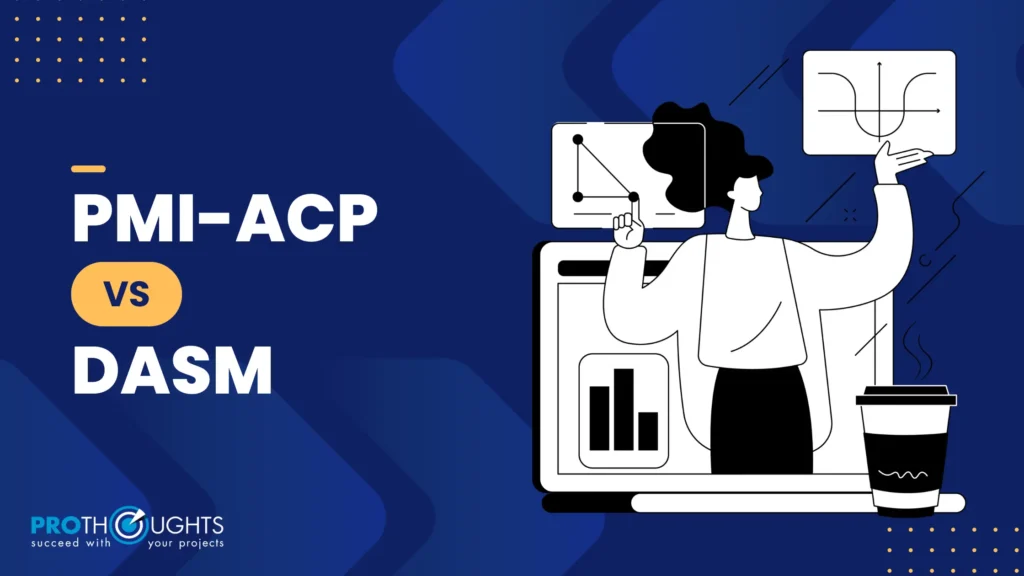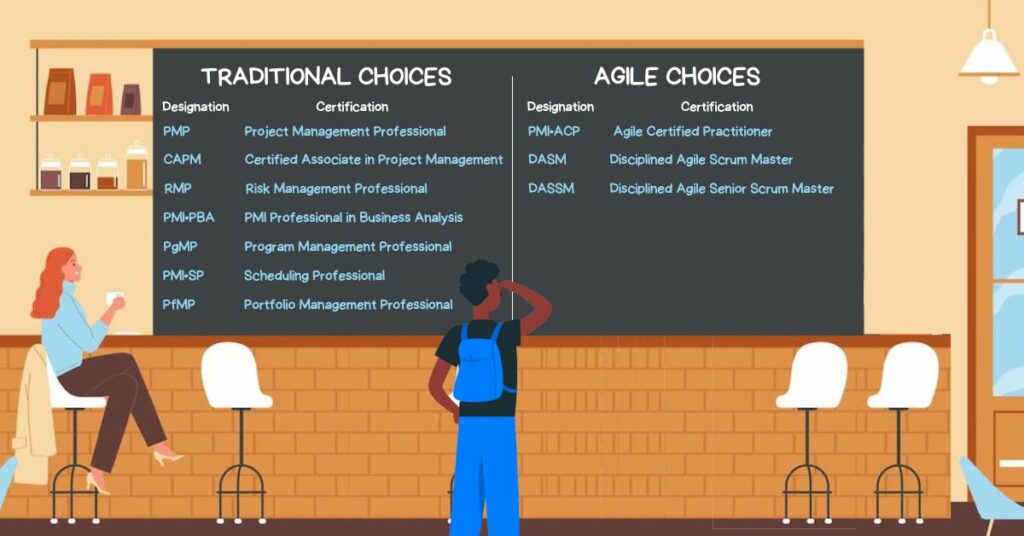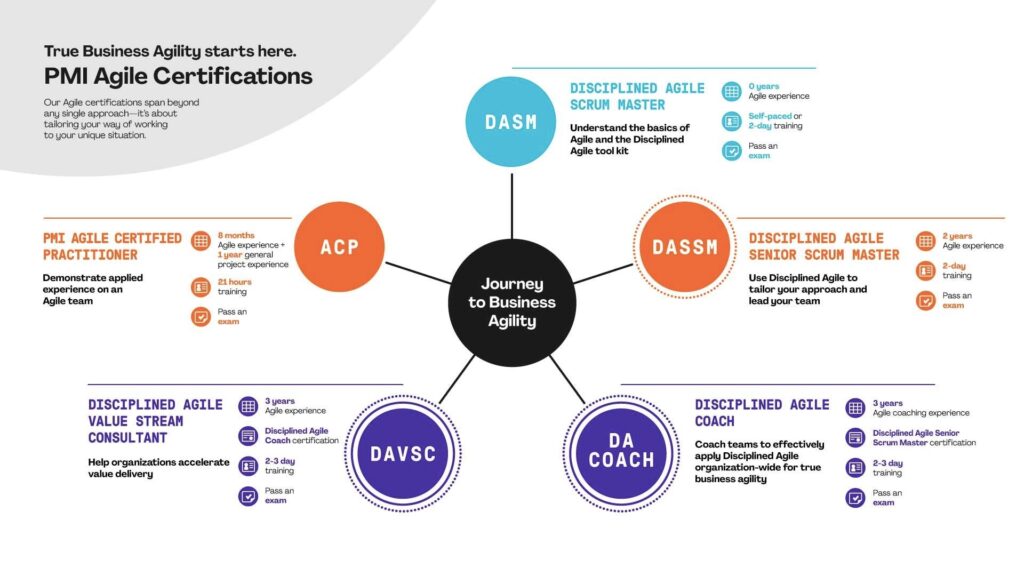
PMI’s Pulse of the Profession 2023 report shows that projects using agile methodologies achieve a remarkable 75.4% success rate. This statistic highlights the growing impact and momentum of agile practices in project management. The key takeaway is that Agile has the power to transform project outcomes and will prove invaluable in future project endeavors. To work with these agile methodologies, you will need to choose the right agile certification!
When comparing PMI-ACP vs DASM or with DASSM, many professionals get confused about which agile certification will be the best for them. As the saying goes, “A good decision is based on knowledge and not on numbers.” Read this blog to gain valuable knowledge into the differences between PMI-ACP, DASM, and DASSM and make a wise decision.
Table of contents
- What is Disciplined Agile?
- What is the toolkit, and how does it differ from a practice?
- How does DA help with agility, and who is it for?
- What is PMI-ACP? What is its goal?
- Differences between PMI-ACP and DA
- Differences between DASM and DASSM
- Similarities between ACP, DASM and DASSM
- About ProThoughts
What is Disciplined Agile?
Disciplined Agile is a hybrid of the world’s leading practices and methods that provide straightforward guidance to enable you to choose your way of working. It’s a people-first, learning-oriented hybrid agile toolkit that will enable you to effectively combine strategies from scrum, agile modeling, extreme programming, kanban, agile data safe, and many other sources so you can tailor and scale based on the situation you face. You’ll be able to look beyond prescriptive agile frameworks, get better results, and reach true business agility faster.
What Exactly is the Toolkit, and How Does it Differ From a Practice?
So, when we talk about methodology, we refer to processes or procedures followed repeatedly to achieve a result. It’s about applying the same practices from previous projects to future ones. Practice is a set of rules and guidelines that are kind of best practices, and agile scrum is a practice that tells you the guidelines for managing agile projects. Practice plus the tailoring of your rules becomes your methodology, which you repeat over some time. A toolkit enables you to make decisions for effective and better outcomes, so the toolkit leverages practices or your methodologies for better outcomes.
How Does DA Help with Agility, and Who is it For?
It discusses the eight principles that define agile as a discipline designed for business agility. So disciplined agile is not for just a particular section of people; In fact, it is for everyone in the organization. Hence, it is right for project managers, product managers, and operations, legal, and procurement. Everyone should align their efforts to deliver value to the customer, as they are all working toward the same goal.
What is PMI-ACP? What is its goal?
PMI launched PMI-ACP in 2012 after starting it as a pilot in 2011. At the time, Scrum was gaining momentum. PMI launched the ACP to see how to implement agility in organizations and to assess skill levels with different agile techniques. The PMI-ACP Exam Content Outline covered various agile techniques guiding the application of agile practices within organizations. The content focused heavily on practical strategies for fostering agility, which became the core of what PMI-ACP offered.
Summing up, the PMI-ACP Exam features all the methodologies and frameworks available to suit an agile work environment. It covers best practices of agile through four domains – Mindset, Leadership, Product, and Delivery. Its emphasis is largely on the skill gap within the industry and its future requirements.
PMI-ACP vs DASM: Key Differences
DASM is an entry-level certification in the field of agile practice which requires no prior agile experience. Whereas, PMI ACP is a comprehensive certification that requires you to demonstrate your ability as well as experience in working within an agile environment. Below is a table that will give you a clear distinction between both these certifications. And you can be your judge as to which suits you the best!
| Aspect | PMI-ACP (PMI Agile Certified Practitioner) | DASM (Disciplined Agile Scrum Master) |
|---|---|---|
| Scope | Broadly covers multiple agile frameworks (Scrum, Kanban, Lean, XP, SAFe, etc.). | Focuses specifically on Disciplined Agile (DA) principles, roles, and practices. |
| Knowledge Areas | Comprehensive agile knowledge. | Foundational understanding of Disciplined Agile. |
| Experience Level | Requires prior agile and project experience. | No prior agile experience is required. |
| Prerequisites | - 2 years of agile experience within the last 5 years - 28 hours of agile training | No prerequisites. |
| Training Requirement | Training is recommended but not mandatory. | Mandatory 2-day training course. |
| Exam Format | 120 multiple-choice questions, 3 hours. | 50 multiple-choice questions, 90 minutes. |
| Certification Level | Advanced, broad-spectrum certification. | Entry-level, DA-specific certification. |
| Ideal for | Professionals who want to validate broad agile expertise and demonstrate agile leadership. | Individuals or teams looking to understand and apply Disciplined Agile basics. |
| Career Impact | Enhances credibility as an agile expert across industries. | Provides foundational DA knowledge; useful for DA-specific roles or organizations adopting DA. |
Difference Between DASM and DASSM
DASM and DASSM are part of a disciplined agenda. DASM is the starting point of an introduction to agile. DASSM focuses on superior people skills and is more focused on how you can get your implementation and agility right for your organization. DASM is more focused on leading the team. DASSM’s idea is to work on more complex projects and interact with upper levels of management to teach agile.
The responsibility of DASSM lies between DASM and a unit head or a functional manager. So DASM is focused on how you can choose your Way of Working and start your disciplined agile journey. Whereas, DASSM focuses more on getting your implementation right, including metrics, planning, reporting, and getting the project right so you can know how to attain your project goals. DASM works on a less complex project and is more involved with the team. While DASSM works with other teams, including the team. DASSM focuses on the soft skills needed to build a high-performance team, which are missing in a DASM. Listed below are a set of distinctions between the responsibilities of DASM and DASSM.
| Aspect | DASM (Disciplined Agile Scrum Master) | DASSM (Disciplined Agile Senior Scrum Master) |
|---|---|---|
| Agile Knowledge Level | Basic Understanding of Agile principles and framework | Advanced understanding of Agile Methodologies and Implementation |
| Primary Focus | Team-level Leadership and Collaboration | Organizational-level Leadership |
| Role Scope | Focuses on leading a single Agile team | Involves managing multiple teams and coordinating different departments |
| Project Complexity | Leads modest Agile projects with limited scope | Manages complex and large-scale Agile Projects |
| Interaction Level | Engages with the team and immediate stakeholders | Engages with upper management, all stakeholders, and cross-functional teams |
| Key Responsibilities | Choosing best practices, and initiating Agile projects | Planning, setting metrics, reporting, and optimizing Agile project outcomes |
| Value Stream Contribution | Enhances team productivity and efficiency | Improves the value stream across an entire organization |
| Management Coordination | Limited to team-level management | Bridges the gap between team-level practices and functional management |
| Metrics and Reporting | Basic performance tracking and reporting | Establish detailed metrics and comprehensive reporting structures |
| Cultural Impact | Responsible for promoting agile culture within the team | Drives and sustains an Agile culture across an organization |
Watch the Video on the Differences Between DASM and DASSM
Similarities Between ACP and DASM and DASSM
All three of these certifications are for professionals interested in agile frameworks. The context varies for each individual according to their industry, roles, and responsibilities. Also, PMI-ACP, DASM, and DASSM come under the agile umbrella. While DASM stands at an entry-level mark in agile certifications, ACP and DASSM can be said to be at one proficiency level. Additionally, both courses are ‘agnostic’ as they do not prescribe which methodology should be used and when. Rather, they provide a set of best practices that can be used when you see it fit to serve the purpose. The only condition is that all these practices are related to agility.
Why does PMI-ACP stand out?
Organizations that adopt agility see improved levels of growth and productivity. This adds value to organizations and gives them an edge over their competitors. With an increase in the popularity of agile methodologies, the need for agile practitioners in the industry is also rising. PMI-ACP is based on recognized and widely used frameworks/methods in agile. So, PMI ACP stands out amongst the existing agile certifications due to its broad extent of focus on frameworks in agile.
PMI conducted a Global Practice Analysis to inquire into the future requirements within the agile industry. Upon completion of the research, PMI decided to update the PMI ACP Exam Content Outline. The new exam format covers streamlined domains, namely Leadership, Mindset, Product, and Delivery. This update also adds to the value of PMI ACP.
About ProThoughts
ProThoughts offers a complete and integrated online program ideal for working professionals. We have a well-structured and highly researched curriculum backed by experts in the industry. ProThoughts also has a specialized methodology known as “Game-Based Learning,” in which we engage participants through games and role-playing.
Enroll in our Certifications Course today and you will have all the knowledge and skills needed to succeed.
Watch this video to gain more useful insights into this topic:





